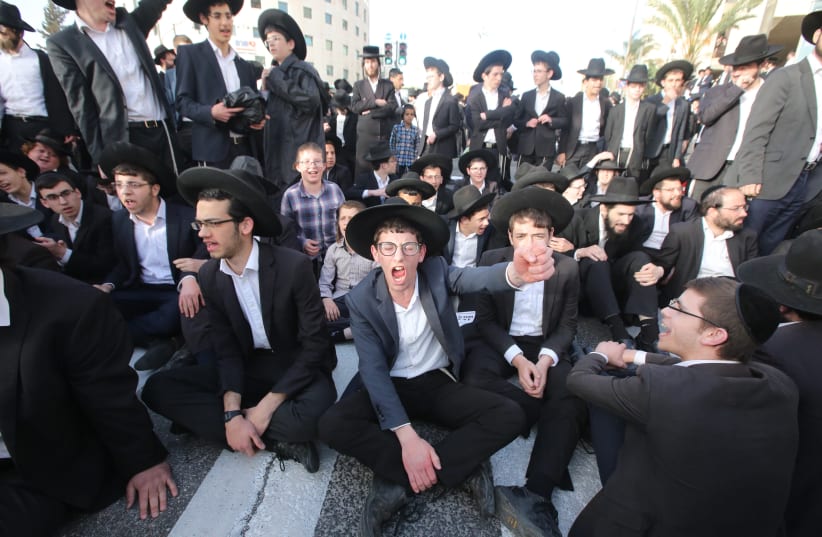The ultra-Orthodox conscription plan that was recently published by the Ministry of Defense stands on two main pillars: 1) promoting equality and security by establishing higher conscription targets for the ultra-Orthodox community over the coming years, and 2) reinforcing these goals with the provision of economic sanctions if these targets are not met. This new plan replaces two former models for ultra-Orthodox conscription that have failed: the first set inscription targets for the entire ultra-Orthodox community and enforced criminal sanctions on the members of the ultra-Orthodox community who did not enlist (with the exception of continuing Torah students); and the second, did not impose any sanctions or consequences when its goals were not met. But the details of the Ministry of Defense’s newest plan show that it has now chosen the easy route, at the expense of promoting equality and the integration of ultra-Orthodox Israelis into the IDF and employment.In recent years, the annual increase in the number of ultra-Orthodox soldiers in the IDF has been around 10%, but the new conscription plan proposes targets that are one-third lower than this rate over the next five years. Civilian national service has proved to be a failed mechanism that has no impact on overall equality, on the individual serving, or on an individual’s preparation for employment, and yet the new plan expands the range of ages between which this service can be performed, while the age at which exemption from military service is available remains high, at 24. This allows the IDF to have access to a larger potential population for conscription, but it ignores the need for integration into employment, which is in the interest of both the ultra-Orthodox population and the greater Israeli economy.The same ineffective approach is evident regarding the proposal for economic sanctions, which, instead of being used as a real incentive for meeting targets, lacks real consequences. According to the plan, sanctions will only be used after three years of failing to meet targets, and even then, only to a limited extent. In this way, rather than being a driver for change, the economic incentive is largely irrelevant.Additionally, the plan does not do anything for those actually serving in the military. Instead of committing to a reduction of at least two months in the mandatory period of service currently demanded of soldiers – a direct and necessary result of the rise in the number of ultra-Orthodox soldiers in the IDF – the Ministry avoids making any such commitment and buries the issue.Though many ultra-Orthodox politicians expressed outrage at the original publishing of this new bill, the chair of the Knesset Finance Committee MK Moshe Gafni and the Shas party view the proposal as a double achievement.First, the bill is largely toothless, and second, it has the benefit of having been approved by the Ministry of Defense and even by the “equal burden” parties such as Yisrael Beytenu and Yesh Atid, who are fighting amongst themselves to take credit for the proposal. These advantages all come before the proposal has even begun the process of being sliced and diced by the various Knesset committees through which it will have to pass.It should be emphasized that most of the amendments that the bill needs are not directed “against” the ultra-Orthodox population. Shortening service for all male soldiers in the IDF, alongside improving the benefits of serving soldiers, are crucial steps that need to be taken at a time when motivation sur rounding military service is plummeting. Directing ultra-Orthodox men toward service in the IDF rather than in civilian national service programs will ensure that they make a much greater contribution to Israel’s security, and that they will also progress in individual, social and professional terms.Another less-harmful step would be to impose economic sanctions on those who seek to delay their service (men aged 18 to 23), rather than targeting yeshiva students as a whole. Why should the penalty for not enlisting be applied to a 40-yearold kollel student who was exempt from service 15 years ago? On the other hand, would a fine that is generally imposed upon an older generation really do much to increase the motivation of army-aged men? Would it not be preferable to act directly and fine, as necessary, the younger population who are our target audience, anyway? The fact that the exemption age for non-serving ultra-Orthodox men will remain 24, and will not come down even slightly, to 22 or 23, also stands out. When do we want these young people to enter professional training or employment? Aren’t the benefits of such a reduction – both to the economy and to the ultra-Orthodox individual – apparent to us all? The Ministry of Defense Professional Committee has begun the work, and has proposed a conscription plan that has the right general foundations but whose detailed proposals are too conservative. Now, politicians in the Knesset – on the right and the left, the secular and the religious, and even the ultra-Orthodox – need to be courageous and amend it. This is an essential step in creating a genuine, successful conscription plan that will promote equality and security while also providing social and individual benefits for the ultra-Orthodox community and for Israeli society as a whole.The writer is the director of the Ultra-Orthodox in Israel Program at the Israel Democracy Institute.
The new conscription plan: Taking the easy route to inequality
Though many ultra-Orthodox politicians expressed outrage at the original publishing of this new bill, some view the proposal as a double achievement.
